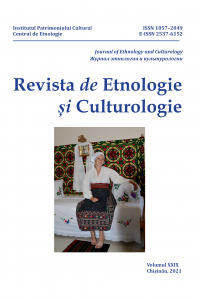Romanian a cinsti in the light of some Romanian-Slavic contacts
Romanian a cinsti in the light of some Romanian-Slavic contacts
Author(s): Aleksey A. RomanchukSubject(s): History, Language studies, Language and Literature Studies, Cultural history, Ethnohistory
Published by: Institutul Patrimoniului Cultural al Academiei de Științe a Moldovei
Keywords: Slavs; Romanians; lexical loanwords; ethnic history; Ukrainian dialects; Moldova; Bukovina;
Summary/Abstract: A group of Slavic loanwords with epenthetic /n/ in the Romanian language, to which a cinsti belongs, is considered. Interpreting the existing set of facts, the author supposes that the semantic convergence between the Slavic честь ‘honour’ and угощение ‘treat’ appeared as far back as the Late Slavic period. The Romanian a cinsti, which is an early Slavic borrowing, also clearly testifies Slavic origin of this semantic convergence. Accordingly, the Ukrainian частувати and Polish częstowac appeared independently from each other, as well as from the Romanian a cinsti. Whereas the Romanian a cinsti (and cinste), as well as the whole group of Slavic loanwords in the Romanian language with the epenthetic sound /n/, are the result of early contacts of the Romanian language with some late Slavic dialect (or dialects), which was characterized by a tendency of widespread epenthetic nasal vowels. We can suppose that some traces of this for-Slavic dialect (dialects) could also be found in the Carpathian Ukrainian dialects as well. In particular, such traces, perhaps, should include both the Ukrainian dialectal чандрий, шандрий, чендрий and another Ukrainian dialectal form, recorded in the Bulaesti village, /мон|золетеи / ‘procrastinate; fiddling around in vain’ (in Russian: ‘мусолить; впустую теребить’).
Journal: Revista de Etnologie şi Culturologie
- Issue Year: XXIX/2021
- Issue No: 1
- Page Range: 101-104
- Page Count: 4
- Language: English

